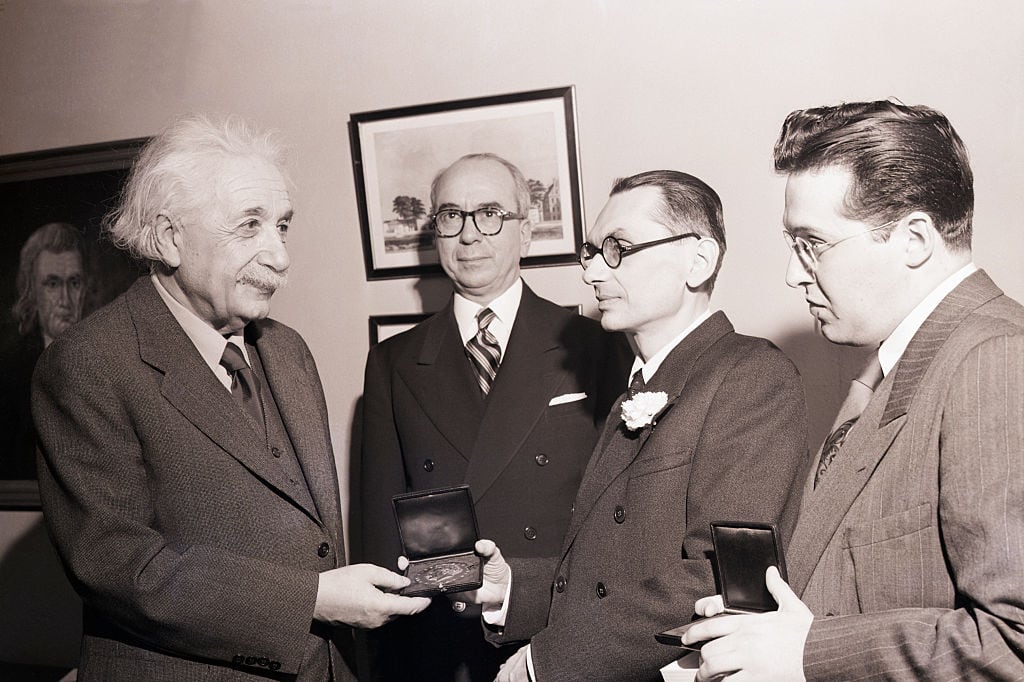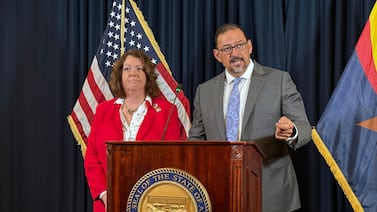Votebeat is a nonprofit news organization reporting on voting access and election administration across the U.S. Dig deeper into how our democracy works with Votebeat’s free newsletters.
Hi, y’all,
Covering voting is exhausting. It often seems to be turning a corner — for example, the resounding loss of nearly every statewide candidate who ran on unfounded election conspiracies — before returning to where it started. For example, a Republican candidate in New Mexico who had refused to accept his loss has been charged in connection with literally opening fire on his political opponents.
There’s always an “and then.” We had a plan, and then. It seemed to be getting better, and then.
And then, and then ...
But that’s part of what comforts me about moments like these: That they’ve always been.
Let’s play “Guess The Year.”
Here are your clues: It was a piece published in The Atlantic called “Democracy and the Expert.” The author would — less than a decade after publication of the piece — become a Supreme Court justice. The first sentence of the piece declared, “Epitaphs for Democracy are the fashion of the day.”
Can you guess the year? This one?
2000?
1989?
1965?
The author was Felix Frankfurter and the year was 1930, though he could easily have been writing for last month’s edition of the magazine. He writes, for example, that the challenges confronting democracy are difficult to face head on given society’s hostility to reflection. “Thus,” Frankfurter writes, “reason is asked to flourish when the conditions for it are least favorable.”
“Little wonder that, for many, democracy seems ripe for the museum of political institutions,” he continues. “They assess its results as bankruptcy and find its inherent difficulties fatal. The naïve champions of democracy at least, built on hope; these latter-day assailants are moved by fear.”
Frankfurter’s piece was, as so many similar columns would be after, a poignant defense of democracy itself. Lots of such pieces are being written now. And, certainly, American democracy is at yet another turning point. Americans, forgetting that we have been in this place before, have begun to panic over the ability of democracy to hold — we all seem to be under the impression that if the tide on democracy goes out, it’s never coming back in.
One of my favorite bits of American history is now something of an internet cult classic: Gödel’s Loophole. Kurt Gödel was a famous Austrian-born logician who palled around with other intellectual greats like Albert Einstein and Oskar Morgenstern (who helped establish game theory).
He told these two friends that, while studying for his U.S. citizenship test in the 1940s, he’d discovered an “inner contradiction” in the U.S. Constitution that would allow the country to tumble into fascism or authoritarianism without breaking a single law.
Gödel never wrote his observation down, or, at least, no one has found evidence of it in his papers. Folks have spent decades trying to figure out what he was talking about. As Trump assumed the presidency in 2016, and again as Jan. 6 slapped us all right in the face as he was about to leave it, speculation perked up again, everywhere from the New Yorker to Reddit.
And while the loophole that occurred to the world’s most impressive logician was, as Adam Gopnik more or less put it in the New Yorker, probably not that the vice president could simply ignore the rule of law and hang on to power, the hard truth is that the fatal loophole might be one of a bunch of different things. U.S. democracy is soft. It requires continual upkeep. The repairs are eventually made, though, even if there’s no such thing as permanent fixes.
When I was a high school teacher, my students would often come to me with problems that – to them – seemed monumental. And in the schemes of my students’ teenage existences, they were. The first time a boyfriend breaks up with you, or you have to get your parents to sign a failing report card, or you get sent to the principal’s office because you cheated on a test, you feel certain you will simply never recover. But my students, of course, were not the first teenagers that year (or that week) to get broken up with or to write a math equation on their hands, they would not be the last, and their worlds, of course, would go on.
In the 1930s and 40s, people like Felix Frankfurter and Kurt Gödel saw the imperfections just like the rest of us did. Probably, if we’re all honest about our own intellectual abilities, more clearly — and at a time when the world was objectively more turbulent. But Frankfurter still took his seat on the Supreme Court in 1939, and Gödel still chose to become a naturalized citizen of the United States in 1948.
“This has happened before, it will happen again, and you aren’t special!” is perhaps not as comforting as I want it to be, when you get right down to it. But I think the comfort we can take comes from how we decide to bounce back, not whether or not we will. And these days, that officially makes me an optimist.
Back Then
As my entire newsletter has been a history lesson, I’ll spare you additional reading.
In Other Voting News
- Steven Frid, currently the security director at the Education Department’s Federal Student Aid office, will be the new executive director of the U.S. Election Assistance Commission, the agency announced in a statement, saying Frid had “dedicated his career to collecting and analyzing data about risks to federal employees, facilities, information, and operations.”
- Alabama’s newly elected secretary of state said he will withdraw the state from participating in a multistate partnership meant to ensure accurate voter rolls, citing concerns about sharing voter information with an out-of-state organization. In a letter to the Electronic Registration Information Center, a nonprofit that has been the subject of baseless conspiracy theories, Allen said the state would immediately stop sharing data, the Associated Press reported.
- Police have arrested a former candidate for New Mexico state Senate and charged him with being behind a conspiracy to shoot at the homes of four Albuquerque Democrats, the Washington Post reported. Solomon Peña, a Republican, promoted baseless conspiracy theories about his own election loss.
- An Arizona appeals court found early voting is constitutional in the state, rejecting an attempt to challenge it by the state Republican party. Judges found that mail voting does not violate the secrecy clause in the state Constitution, the Arizona Republic reported.
- A Republican megadonor facing felony charges over a private investigation into voter fraud that prompted an armed confrontation with an air conditioning repairman continues to insist he has evidence of voter fraud and raise money to investigate it, the Houston Chronicle reported.
Jessica Huseman is Votebeat’s editorial director and is based in Dallas. Contact Jessica at jhuseman@votebeat.org.




